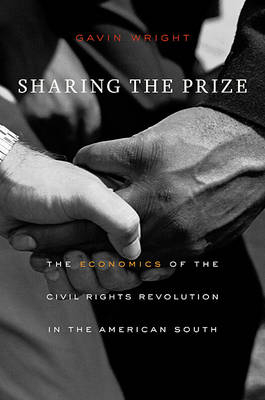
Sharing the Prize
The Economics of the Civil Rights Revolution in the American South
Seiten
2013
The Belknap Press (Verlag)
978-0-674-04933-8 (ISBN)
The Belknap Press (Verlag)
978-0-674-04933-8 (ISBN)
- Titel ist leider vergriffen;
keine Neuauflage - Artikel merken
Southern bus boycotts and lunch counter sit-ins were famous acts of civil disobedience but were also demands for jobs in the very services being denied blacks. Gavin Wright shows that the civil rights struggle was of economic benefit to all parties: the wages of southern blacks increased dramatically but not at the expense of southern whites.
The civil rights movement was also a struggle for economic justice, one that until now has not had its own history. Sharing the Prize demonstrates the significant material gains black southerners made--in improved job opportunities, quality of education, and health care--from the 1960s to the 1970s and beyond. Because black advances did not come at the expense of southern whites, Gavin Wright argues, the civil rights struggle was that rarest of social revolutions: one that benefits both sides. From the beginning, black activists sought economic justice in addition to full legal rights. The southern bus boycotts and lunch counter sit-ins were famous acts of civil disobedience, but they were also demands for jobs in the very services being denied blacks. In the period of enforced desegregation following the passage of the Civil Rights Act of 1964 and the Voting Rights Act of 1965, the wages of southern black workers increased dramatically. Wright's painstaking documentation of this fact undermines beliefs that government intervention was unnecessary, that discrimination was irrational, and that segregation would gradually disappear once the market was allowed to work.
Wright also explains why white southerners defended for so long a system that failed to serve their own best interests. Sharing the Prize makes clear that the material benefits of the civil rights acts of the 1960s are as significant as the moral ones--an especially timely achievement as these monumental pieces of legislation, and the efficacy of governmental intervention more broadly, face new challenges.
The civil rights movement was also a struggle for economic justice, one that until now has not had its own history. Sharing the Prize demonstrates the significant material gains black southerners made--in improved job opportunities, quality of education, and health care--from the 1960s to the 1970s and beyond. Because black advances did not come at the expense of southern whites, Gavin Wright argues, the civil rights struggle was that rarest of social revolutions: one that benefits both sides. From the beginning, black activists sought economic justice in addition to full legal rights. The southern bus boycotts and lunch counter sit-ins were famous acts of civil disobedience, but they were also demands for jobs in the very services being denied blacks. In the period of enforced desegregation following the passage of the Civil Rights Act of 1964 and the Voting Rights Act of 1965, the wages of southern black workers increased dramatically. Wright's painstaking documentation of this fact undermines beliefs that government intervention was unnecessary, that discrimination was irrational, and that segregation would gradually disappear once the market was allowed to work.
Wright also explains why white southerners defended for so long a system that failed to serve their own best interests. Sharing the Prize makes clear that the material benefits of the civil rights acts of the 1960s are as significant as the moral ones--an especially timely achievement as these monumental pieces of legislation, and the efficacy of governmental intervention more broadly, face new challenges.
Gavin Wright is William Robertson Coe Professor of American Economic History at Stanford University.
| Erscheint lt. Verlag | 25.2.2013 |
|---|---|
| Zusatzinfo | 2 halftones, 3 maps, 47 graphs, 16 tables |
| Verlagsort | Cambridge, Mass. |
| Sprache | englisch |
| Maße | 140 x 210 mm |
| Themenwelt | Geschichte ► Allgemeine Geschichte ► Neuzeit (bis 1918) |
| Geisteswissenschaften ► Geschichte ► Regional- / Ländergeschichte | |
| Geschichte ► Teilgebiete der Geschichte ► Wirtschaftsgeschichte | |
| Sozialwissenschaften ► Politik / Verwaltung | |
| ISBN-10 | 0-674-04933-0 / 0674049330 |
| ISBN-13 | 978-0-674-04933-8 / 9780674049338 |
| Zustand | Neuware |
| Haben Sie eine Frage zum Produkt? |
Mehr entdecken
aus dem Bereich
aus dem Bereich
Europa 1848/49 und der Kampf für eine neue Welt
Buch | Hardcover (2023)
DVA (Verlag)
48,00 €
Giordano Bruno - ein ketzerisches Leben
Buch | Hardcover (2024)
C.H.Beck (Verlag)
29,90 €


